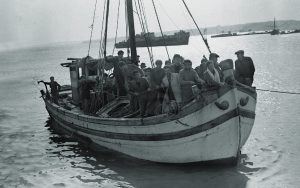 Last time out, I wrote about a forgotten campaign: the Allied landing in the south of France in August 1944. The planners first called it Operation Anvil, then renamed it Dragoon just days before it took place. By any accounting, it should be a major part of the narrative of World War II. It put ashore two allied armies—the 7th U.S. and “French Army B” (later redesignated 1st French Army), and they eventually comprised the 6th U.S. Army Group under General Jacob L. Devers. It seized a good-sized port (Toulon) followed by a truly massive one (Marseille). It resulted in far more pressure being put on the Germans than could have been applied by the Overlord landing alone. And yet, you have to look pretty hard to find it in the history books. It usually gets a paragraph in a standard history of the war, and often that lone paragraph contains some pretty disparaging language about the senselessness of it all.
Last time out, I wrote about a forgotten campaign: the Allied landing in the south of France in August 1944. The planners first called it Operation Anvil, then renamed it Dragoon just days before it took place. By any accounting, it should be a major part of the narrative of World War II. It put ashore two allied armies—the 7th U.S. and “French Army B” (later redesignated 1st French Army), and they eventually comprised the 6th U.S. Army Group under General Jacob L. Devers. It seized a good-sized port (Toulon) followed by a truly massive one (Marseille). It resulted in far more pressure being put on the Germans than could have been applied by the Overlord landing alone. And yet, you have to look pretty hard to find it in the history books. It usually gets a paragraph in a standard history of the war, and often that lone paragraph contains some pretty disparaging language about the senselessness of it all.
But why? Why has Anvil fallen in to the memory hole for American readers? I think we can identify three reasons:
1. It happened in the Mediterranean. Let’s face it, Mediterranean operations have never grabbed the attention of the American people the way that the battles in Normandy and Western Europe have.
2. The French were involved. I teach World War II for a living, and the notion that the French were fighting alongside the Americans and British often evinces a certain amount of surprise from the student body, along with a hefty amount of disinterest. I’m not saying that’s a good thing. But it exists.
3. There was no real fight. By the time the Allies landed along the Riviera, the Germans were in trouble—deep trouble—in Normandy. Their front had been ruptured as a result of the U.S. Army’s success in Operation Cobra, the cream of the Wehrmacht in the West was desperately trying to escape annihilation near Falaise, and there were many in the Allied high command who felt that Germany might be finished in a month or so. Thus, there wasn’t a lot a spare force lying around for the Germans to contest Anvil, and the results showed it. The Allies got ashore without much of a fight. There was no equivalent of Omaha Beach. No fighting in the last ditch. No need for General Norm Cota-style heroics.
I could go on. But instead, let me offer a response to each of these issues.
1. Yes, it happened in the Mediterranean, but it impacted the ETO. It put an army group on the German border within months. This was a far different campaign from the tough fighting in Italy, which after June 1944 truly was a fight to nowhere, and which still remains controversial for students of the war.
2. You don’t care about the French army in 1944? Get over it. There were precisely seven armies in the Allied order of battle in Western Europe. Certainly U.S. manpower dominated—providing four of the seven. But America’s allies did their part—one British army, one Canadian army, and one French army. Take away any of these three and you have less Allied fighting strength, less forward momentum, and more Germans troops in the reserve to plug holes. It’s a different war, and from the Allied perspective, a worse one.
3. Funny, I always thought an uncontested and relatively bloodless landing should be considered a success! Certainly, it’s hard to imagine the Dragoon landing being the subject of a movie like Saving Private Ryan. I get that.
In the end, I know that fewer people want to read about a battle that was more about logistics than heroism. But an absence of blood doesn’t mean it was any less important. Last time out, I mentioned an amazing statistic, the one about the port of Marseille accounting for 25% of all Allied tonnage shipped into the European theater. It’s just one number in a campaign of many numbers, and perhaps for that reason it is easy to underplay. But it is also a number that represents a logistical triumph of the first magnitude, in a war where supply was the principal limiting factor on Allied operations. I never met General Eisenhower, but if he were alive today, I am fairly certain that he would have some choice words for those who downplay the importance of Marseille. Ike was a smart guy, and if he understood one thing about modern war, it was the enormous logistical requirements that supported it.
They say that amateurs talk battle, while professionals talk logistics. I agree. And for this reason alone, maybe we should talk about Anvil-Dragoon a lot more than we do.




